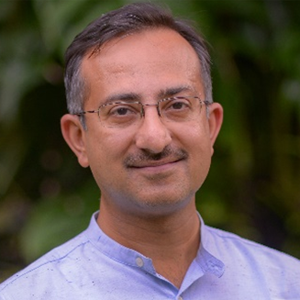Mangrove ecosystems play an important role in coastal protection, sustainable livelihoods and biodiversity conservation. These unique ecosystems are vulnerable to climate change and it negatively impacts vulnerable coastal communities. Understanding the interconnectedness of these unique socioecological systems would aid in management and protection for sustaining biodiversity that depend on these ecosystems.
A greater understanding of mangrove ecosystem services, carbon sequestration benefits, biodiversity conservation and enhanced resilience is essential for India’s coastal sustainability, including the well-being of vulnerable communities. Equally important is the availability of sound scientific information for planning and implementing successful mangrove restoration. Adopting scientific methodologies and monitoring techniques using advanced technical tools can inform and improve management of mangrove ecosystems. Setting up regular mangrove monitoring efforts will allow relevant stakeholders and managers to keep a check on the overall ecological health and to take appropriate action when problems arise.
The vision for this India Mangrove Conclave (IMC) is to make mangrove science, research and best practices readily available and accessible to managers and other stakeholders to ensure sustainability and resilience of these ecosystems for the benefit of society.
This conference will convene voices and perspectives from different stakeholders connected to India’s mangrove ecosystems. It will provide a platform for exchange of knowledge in discussing challenges and drivers of mangrove loss in India and best practices on mangrove conservation; examining how scientific research can be applied to improve mangrove ecosystem functions and enhance benefits for local communities. By highlighting mangrove research in India, this conference aims to catalyse multi-institutional collaboration to enhance mangrove research and promote practices leading to improved coastal ecosystem sustainability. This gathering will foster linkages between India’s scientific research community, practitioners, managers and coastal communities, as well as coastal industry and tourism sectors, including government and non-government entities. The conference will strive to develop an outline for a broad roadmap for integrated and holistic sustainability of Indian mangrove ecosystems based on scientific evidence and best practices.
Goal and objectives
The conference goal is to convene researchers, practitioners and stakeholders from the country’s mangrove ecosystems for a knowledge exchange to identify opportunities in improving these ecosystems sustainably. Sessions will broadly cover topics around livelihoods, biodiversity conservation, climate mitigation, vulnerability and adaptation, and ecological restoration in the context of mangroves. The objectives of these sessions will be to:
- Develop an outline to produce a practical guide that empowers mangrove managers to utilize the latest scientific research and best practices for enhancing coastal resilience and improved management;
- Facilitate discussions and knowledge exchange to encourage novel strategic research collaborations on mangroves as nature-based climate solutions;
- Reach a consensus to develop/constitute a National Mangrove Centre to act as a repository of available knowledge, scientific and practical understanding of the country’s various mangrove ecosystems, and for providing needed advice/guidance to tackle issues related to better management of mangroves across the country.
Mangrove reference IMC Abstracts
Useful information Event photos
Conference themes

Mangrove ecosystems: Scientific research and best practices
- Mangrove research advances and gaps in the Indian setting
- Mangrove extent change and risks to existing mangroves including efforts to address it
- Innovative in-situ and remote sensing monitoring for decision support
- Traditional knowledge and community-based conservation

Mangroves for adaptation, biodiversity and human well-being
- Biodiversity and ecosystem services of mangroves
- Sustainable coastal management and ecosystem-based adaptation
- Nature-based solutions for coastal resilience
- Mangrove restoration and potential for climate mitigation and adaptation
- Leveraging institutional setups for collaborative and holistic management
- Information and knowledge management for greater effectiveness and impacts
Videos
Agenda
Program Agenda Oral presentations and posters list
Plenary Talks
- Leveraging Institutional Setup for Collaborative and Holistic Management
Bakan Jagdish Sudhakar, Wildlife Warden - Mangroves for Climate Action, Biodiversity & Sustainability: Adaptation & Nature-based solutions
K. Kathiresan, Annamalai University - Ecosystem services and livelihood options through responsible ecotourism
Muhammed Nahar, Adjunct Faculty, Indian Institute of Tourism & Travel Management, Bhubaneswar - Mangrove research: Advances and gaps in Indian settings
V Selvam, Consultant - Geospatial technology for mangrove monitoring and decision support
C. Sudhakar Reddy, Forest Biodiversity and Ecology Division National Remote Sensing Centre, Hyderabad - Evolving strategies in Mangrove Plantation in Gujarat: A new Era of Coastal Conservation
G A Thivakaran, Chola MS Risk Services
Oral and poster presentations
Oral presentations
Parallel Sessions | Time:14:20-15:20
- Varuna Hall-Session I: Climate Change & Coastal Resilience
- Perspectives of Establishing a Cyclone Ecology Research in a Mangrove Estuary of India
Sourav Paul, Estuarine and Coastal Studies Foundation - Methane Water-to-Air Flux and Carbon Storage Potential in Restored Mangroves: Insights for Climate Resilience and Adaptation
Regina Hershey N, Cochin University of Science and Technology - Loss and Gains: Two Decades of Post-Tsunami Mangrove and Carbon Stock Recovery in the Nicobar Islands, India
Thirumurugan Vedagiri, Madras Christian College, Chennai/WII - Stable Isotopes of Carbon and Nitrogen in Surface Sediments of Mangrove Creeks and Kakinada Bay Ecosystem (Andhra Pradesh, India)
Appala Naidu S, National Centre for Coastal Research
- Perspectives of Establishing a Cyclone Ecology Research in a Mangrove Estuary of India
- Panikkar Hall-Session II: Coastal Biogeochemistry
- Environmental and Physiological Drivers of Evapotranspiration of a Tropical Mangrove in India
Pramit Deb Burman, Indian Institute of Tropical Meteorology - Patterns of Carbonate Chemistry from a Mangrove Dominated Coastal Ecosystem Influenced by Environmental Perturbations
Nirupama Saini, Indian Institute of Science Education and Research Kolkata - Tracking Role of Nitrate on Sedimentary Carbon Storage of Indian Sundarbans- An Insight from Lipid Biomarkers
Arindam Roy, Indian Institute of Science Education and Research Kolkata - Dynamics and Interaction of Dimethyl Sulfide (DMS) and Methane in Coringa Mangrove
Damodara Rao Valavala, National Centre for Coastal Research
- Environmental and Physiological Drivers of Evapotranspiration of a Tropical Mangrove in India
- Qasim Hall-Session III: Ecosystem Sustainability
- Isolation and Identification of Nitrilase and Laccase Producing Halophilic Bacteria from Mangrove Ecosystem
Anjali Balakrishnan, Central University of Kerala - Catenella Sp., A Red Alga as an Indicator of Mangrove Ecosystem’s Vulnerability: A Preliminary Study from Indian Sundarbans
Anjali Ghosh, West Bengal State University - Understanding Sustainability Aspects of Mangrove Ecotourism Project, Songaon, Maharashtra
Manasi Dichwalkar, Forest Research Institute Dehradun
- Isolation and Identification of Nitrilase and Laccase Producing Halophilic Bacteria from Mangrove Ecosystem
- Rajendra Chola Hall-Session IV: Restoration & Conservation
- Community Perception Survey on Best Practices for Sustainable Management in Pulicat and Pichavaram Mangrove Ecosystems, Tamil Nadu, India
Krishnaveni M, Institute for Ocean Management, Anna University, Chennai - Native Biodiversity Restoration in Degraded Mangrove Habitats: Experimented in Indian Sundarbans on a Pilot Scale
Chayan Kumar Giri, West Bengal State University - Communities for Mangrove Conservation – A Case Study from Kannur, Kerala
Binod Chandra Choudhury, Wildlife Trust of India - Relevance of Community Perceptions in Mapping Cultural Ecosystem Services: Lessons from Bio-Cultural Landscape of Bhitarkanika Wildlife Sanctuary, Odisha
Rupali Nayal, CSIR-NEERI
- Community Perception Survey on Best Practices for Sustainable Management in Pulicat and Pichavaram Mangrove Ecosystems, Tamil Nadu, India
Poster presentations
- Community based mangrove restoration through Corporate Social Responsibility in east coast of India – An insight and prospect for transformation
Adhavan Devendiran, HCLFoundation - The diversity, drivers, consequences, and management of plant invasions in the mangrove ecosystems
Somitta Augusthy, Central university of Kerala - Mangrove wood borers: distribution and abundance of an understudied faunal community with special emphasis on south Andaman islands, India
Marimuthu Pandi, Sathyabama Institute of Science and Technology - Decoding 20 years of mangrove health: insights from Godavari, Krishna, and Pichavaram through Google Earth Engine
Adithya Chandra P. B., Central Marine Fisheries Research Institute - Mangrove Litter and Integrated Mangrove Aquaculture (IMA) Systems Implications Towards Sustainable Coastal Aquaculture in Sundarbans
Yash Yash, IISER-Kolkata - The role of mangrove deities and cultural beliefs in mangrove conservation: A case study from the Coringa mangroves, Andhra Pradesh
Velumani T, Bay of Bengal Programme InterGovernmental Organisation (BOBP-IGO) - The status of mangrove and mangrove associates diversity of Purna estuary and surroundings of south Gujarat sea coast
Vipulkumar Patel, Navsari Agricultural University - Crabs on the move: Influence of coastal uplift and subsidence on Crab community in the Andaman Islands
Mayur Fulmali, Wildlife Institute of India - Metabolic convergence in mangrove community for cellular homeostasis: An insightful study for Sundarbans mangrove species
Hemendra Nath Kotal, West Bengal State University - Estuarine Cyanobacteria are powerhouses for secondary metabolite production
Anwesha Ghosh, Indian Institute of Science Education and Research Kolkata - Bird diversity along two mangrove-forested creeks on maharashtra coast
Mosam Kumbhare, College of Forestry, Dapoli Presently Studying at Indian Institute of Forest Management, Bhopal - Quantifying debris sources and impact in mangrove ecosystems under human pressure
Ponmani Muthu, Tamil Nadu Dr.J.Jayalalithaa, Fisheries University, Fisheries College and Research Institute - Mangrove conservation and livelihood transitions through community participation: A study from Sindhudurg district of the Western Ghats of Maharashtra
Mayuresh Bhise, Birla Institute of Technology and Science (BITS) Pilani - Ex-situ conservation of mangroves in non-tidal conditions of eastern India
Animesh Sinha, Genetics and Tree Improvement Division, ICFRE – Institute of Forest Productivity, Ranchi - A systematic synthesis on the Indian mangrove research since 1900: Trends and research gaps
Anoop Raj Singh, Wildlife Institute of India, Department of Zoology and Environmental Science, Gurukula Kangri (deemed to be) University, Haridwar, India
Contacts


























